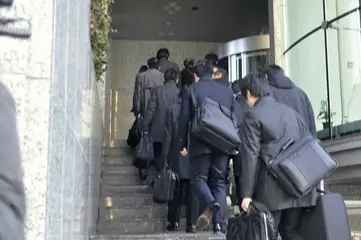(THE YOMIURI SHIMBUN)Public prosecutors and the Fair Trade Commission started searching the head offices of more than 10 road paving companies and related locations on Wednesday in connection with their alleged bid-rigging on projects to repair expressways damaged by the Great East Japan Earthquake.
Some costs of the restoration work were covered by massive subsidies received from budgetary appropriations set aside by the government for rehabilitation projects in the wake of the 2011 earthquake. These companies may have sought to take advantage of the reconstruction work to divide profits from the projects involved, according to investigative sources.
The action was taken by the FTC and the special investigation squad of the Tokyo District Public Prosecutors Office. Some of the firms have admitted to rigging bids in violation of the Antimonopoly Law, the sources said.
The firms subject to Wednesday’s searches included Maeda Road Construction Co. in Shinagawa Ward, Tokyo, and Nippon Road Co. in Minato Ward, Tokyo. Maeda and Nippon, both major firms in the industry, are believed to have been in charge of making preparations for collusion in the bidding sessions.
The corporations also included leading firms Taisei Rotec Co. in Shinjuku Ward, Tokyo, and Toa Road Corp. in Minato Ward, Tokyo.
The special investigation team’s compulsory investigation on bid-rigging charges is the first in about two years, following its action taken in connection with a case involving rigged bids on projects to implement measures to contain snow damage along the Hokuriku Shinkansen line in February 2014.
Investigators are set to continue their searches through Thursday, targeting more than 10 companies that had joined bidding sessions for the projects in question. They are working to analyze documents seized from these companies, the sources said.
A total of 12 expressway repair work projects are believed to have been subject to bid-rigging, including those for expressways in Miyagi and Fukushima prefectures. Contracts for the orders were placed under conditionally competitive bidding sessions.
The orders were placed by East Nippon Expressway Co., which had received a total of about ¥49 billion in subsidies from the government’s reconstruction budgetary allocations. NEXCO East spent about ¥16.2 billion, one-third of the total, on the 12 repair work projects.
On July 8, 2011, NEXCO East released order-placement forecasts for each of the projects. On that day, Nippo Corp. in Chuo Ward, Tokyo, Maeda and Nippon, all in charge of bidding session arrangements, held a meeting along with the Tohoku branch office in Sendai of Seikitokyu Kogyo Co., a Minato Ward, Tokyo-based firm. At the meeting, marketing personnel from these firms decided on a proposal regarding the allocation of the projects among their companies.
The proposal is believed to have been conveyed to these companies by mid-July that year, with a consensus eventually formed among them.
Bidding sessions for the 12 projects were conducted from August to September that year. Each of the 12 corporations was awarded a contract for one project. Eleven of the contracts were received in exact accordance with the proposal earlier put together by the firms in question.
However, one contract was given to a company other than the firm expected to win it under the proposal. The latter corporation’s bid was found to be invalid because of deficiencies in the documents submitted.
The total amount of bids received by these firms was about ¥17.6 billion, including taxes. The figure showed the amount of the bid received by each winner pointed to an average of 94.77 percent of the prices in the order-placement forecasts.
This signified a sharp increase from an average of 80.96 percent in road paving work projects conducted in pre-earthquake fiscal 2010. Figures for seven of the 12 projects exceeded 95 percent, and more than 99 percent for four of them.
Employees from some companies have told the special investigation squad they were engaged in rigging bids. “For the sake of early reconstruction, we desperately wanted to avoid a situation in which no winner would be selected for each contract,” one such person was quoted as saying.Speech
 简体中文
简体中文

